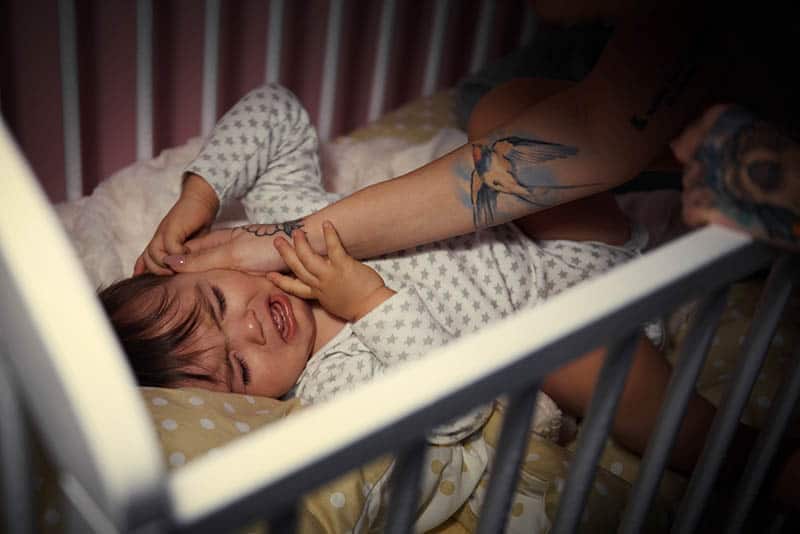I think it’s one of the most frequent questions of all new parents out there: Why does my baby cry in her sleep? The best advice I can give you off the bat is that there is no need to panic. Occasional baby crying in sleep is perfectly normal and you needn’t worry too much about it.
I know that when our little ones start crying suddenly in the middle of the night, it can freak us out, but we have to stay calm and try to soothe and calm them down.
Your parental instincts make you respond immediately when you hear your baby cry, and so should you.
Still, once you’ve checked all possible reasons for his fussing and realize he’s actually crying for no apparent reason, you should let him cry it out.
Well, of course there is a reason and that reason is, in most cases, that the baby needs contact with mom.
He wants to feel you; he may want to breastfeed even if he isn’t hungry at all, just to have the comfort of your closeness.
You’ll see, once you put him to your breast, more often than not he’ll quickly calm down.
However, once you decide that you want to try sleep training, you’ll learn that you shouldn’t immediately pick him up and breastfeed him.
Why do babies cry in their sleep?

Let’s cut to the chase here. It’s not going to be that easy because there are multiple answers to this question.
There may be more than one cause for your baby crying in sleep. So, let’s find out some possible reasons for your baby’s sleep problems.
1. Your comfort
This is probably the most common cause behind your baby crying at night for no reason.
You’ve done your bedtime routine, fed her – everything you do every night – and after a while, your baby starts fussing yet doesn’t wake up.
You may think that you should wake her up and feed her again or call your healthcare provider. Don’t.
Your baby just needs to feel your touch. She needs a mommy cuddle and to know that she isn’t alone. You’ll help her best by simply holding her in your arms and shushing her.
Just cuddle with her or lie next to her. Try not to wake her up – that will likely get her even more upset.

2. Sleep regression
This is a stage that, unfortunately, most babies have to go through. Their sleep cycles are changing and they need some time to adjust to it.
Fortunately, it lasts just a short amount of time – approximately two to four weeks.
You know your baby is going through a sleep regression when she has trouble settling down, wakes up more often than she usually does, or starts crying in the middle of the night without any apparent reason.
It mostly happens with 4-month-old babies and can occur a few more times during their first year.
However, the important thing to know is that it’s just temporary. It’ll pass.
Stick to your bedtime routine and, no matter how exhausting it gets, don’t allow some bad and unhealthy sleep habits to take over.
Just try to think about how it will pass sooner than you think and really try to keep things as consistent as possible.

3. Hunger
Although there’s probably more obvious signs that your baby is hungry, like waking up and crying while putting her fingers or fist in her mouth, hunger can also be one of the reasons for your baby crying in sleep.
Newborns get hungry quickly because their small tummies digest breast milk very fast.
You can try breastfeeding your baby and if she refuses it, the next step would be to look for another reason for her being upset.
The AAP (American Academy of Pediatrics) recommends breastfeeding until at least 6 months of age.
So, if you’ve tried to wean your little one off breastfeeding too soon or abruptly, your baby’s crying in sleep is likely her way of dealing with the sudden change.
She probably misses it and is still not quite ready to give up breast milk.

4. Long naps during the day
Learn your baby’s sleep patterns and regulate them. Control how often and how long your baby naps during the day.
If she is very active that day and gets overtired, she won’t be able to sleep longer periods at night.
Pay attention to the duration of her nap time. It should ideally not be longer than 3 hours, because the longer the naps during the day, the more disruptive your baby’s nighttime sleep will become.
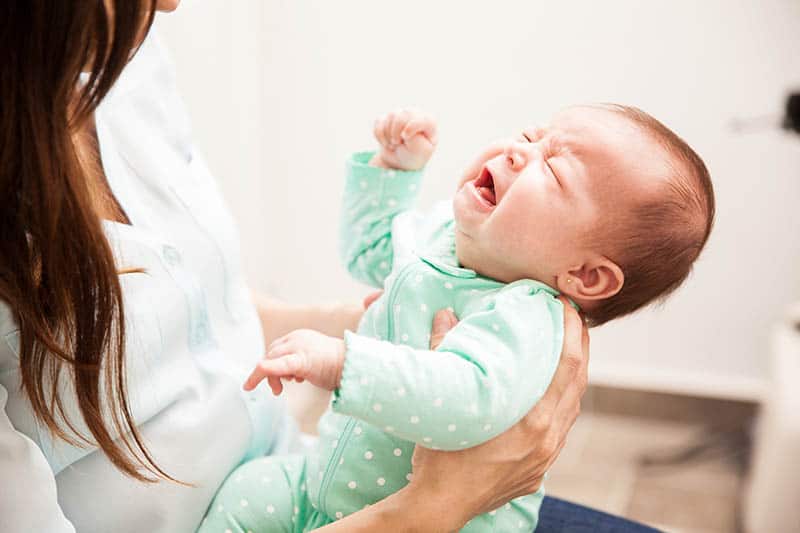
5. Teething
I think I’m speaking on behalf of all parents when I say that teething is the worst. Almost every baby feels some teething pain.
If this is the reason your baby cries in sleep, you’ll know it for sure. There are so many symptoms that can tell you if your baby is in fact teething.
Sleep problems and disrupted sleep are some of them. Your baby may also drool, have a mild temperature or even diarrhea, and often have a rash around her mouth.
If you’re not sure how to help your teething baby, you can consult with your pediatrician and ask him for some products that will provide your little one with some relief from the pain.

6. Viral infections
If there are any signs that your baby has a cold, the flu, or any other illness (for example,high fever, red eyes, and stuffy nose) then that’s most likely why your baby is crying in her sleep.
The best solution would be to call your health provider to find out the best course of action.
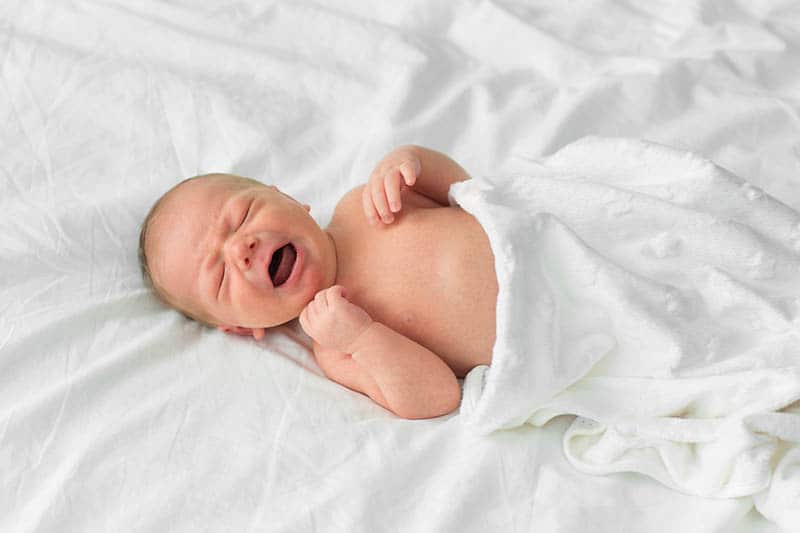
7. Digestive discomfort
Most babies spit up a little after they’ve been fed.
However, if you’ve noticed that your little one is vomiting or spitting up frequently throughout the day, together with the aforementioned sleep problems, she’s probably sitting with some digestive issues.
Also, if your baby has hard stools or farts a lot, those are also signs of indigestion.
The best is to give your pediatrician a call, or you can try some homemade (baby-safe) remedies to improve your baby’s digestion.
You’ve probably heard that stomach sleeping will help your baby’s digestion problems and think it’s a good idea to put her down to sleep on her belly.
This is a big no-no, and especially when it comes to newborns.
Stomach sleeping increases the risk of SIDS (sudden infant death syndrome). That’s why during your baby’s first year, it’s important to rather place your baby on her back.
At approximately 4-6 months of age, your baby will try stomach sleeping when she has mastered rolling over.
Only then is she ready to sleep on her belly. Even then, though, continue to initially put her down on her back, and keep a watch.

8. Night terrors
If your munchkin has stayed up past her bedtime, she’s probably going to be tired.
If you change your bedtime routine or sleep schedule, it may affect your baby. And these circumstances are often the cause for night terrors.
They usually happen soon after the baby falls asleep.
She may first start mumbling something and fussing, then start crying, but she won’t wake up. It normally lasts about two minutes before your baby returns to deep sleep.
There isn’t much you can do.
The most important thing is that you don’t wake your child, no matter how frightening it may seem. It’ll pass soon and they’ll fall asleep again as if nothing happened.
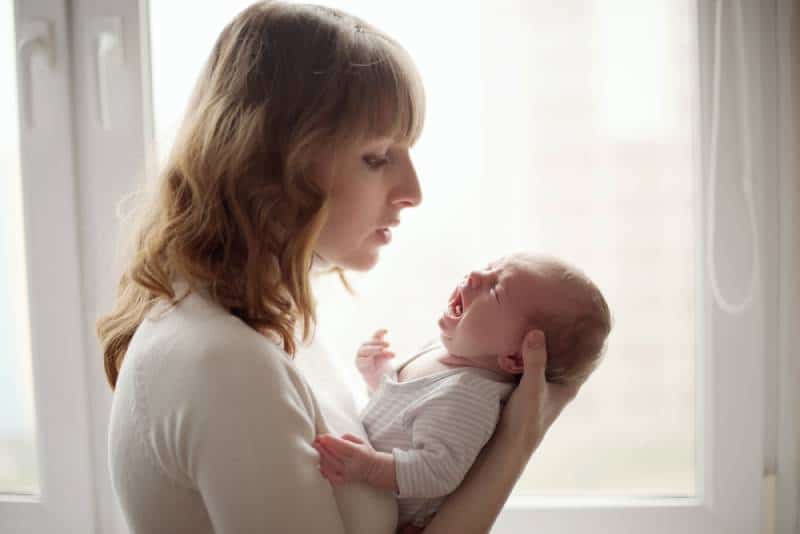
9. Nightmares
Many parents think that night terrors and nightmares are the same. Unfortunately not. There is one huge difference that helps to tell them apart.
As I said previously, night terrors usually happen early in your baby’s nighttime sleep (during the non-REM sleep), while nightmares happen during the rapid eye movement sleep (also known as “active sleep”) later in the night.
Again, you shouldn’t wake up your child if she doesn’t wake up by herself.
Try to hold her hand or pull her blanket closer to her cheeks just to reassure her that she isn’t alone.

10. Juvenile nervous system
Sometimes you need to face that there really is no reason for your baby crying in her sleep because her nervous system is not yet mature like ours.
As she’s still exploring the world out there, she’s also figuring out her body and everything about it.
Just be patient and be there for your little one through it all. The nervous system of new babies will mature during the first year of their life.
How to soothe your baby
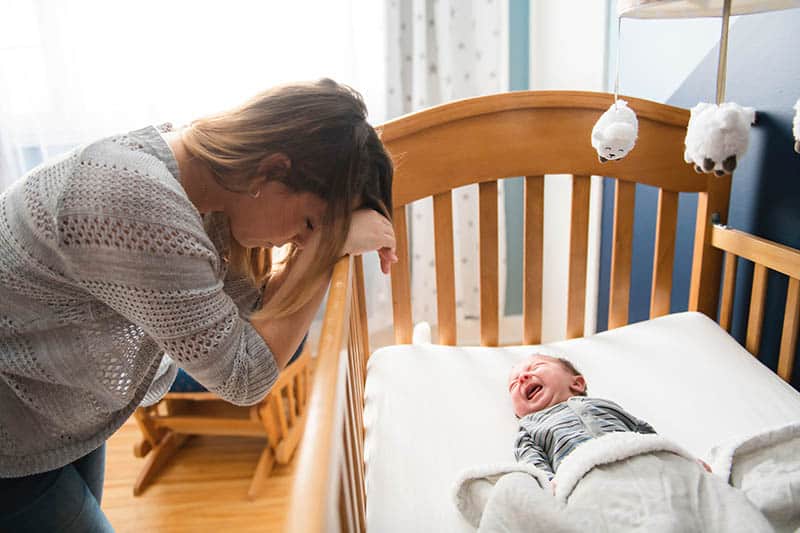
1. Find the reason behind all the fussing
So, first of all, try to find the reason for all that crying and fussing, and react according to that.
If it’s any of the reasons mentioned above, there is a tip for each on how you can calm your baby down.
2. Provide skin-to-skin contact
If it doesn’t help and your baby keeps crying in her sleep, gently pick up your little one and hold her to your chest.
Being able to feel your skin and smell your scent should calm her down.
3. Offer them a pacifier
Try to soothe her with a pacifier, too. Maybe she’s actually crying because the pacifier fell out while she was asleep. However, if your baby doesn’t accept it, don’t force it.
4. Try rocking, singing lullabies, or playing white noise
You can also try some usual tricks to help your baby fall back to sleep.
You can rock her, or sing or hum a soothing lullaby (the sound of mom’s voice is usually calming for little babies). You can even try to help your child sleep with the help of white noise.
5. Don’t have your baby in a separate room until at least 12 months old
Don’t separate your kid too early from you in a different room. Young children feel your presence and being separated from you may be one of the reasons for the fussing and crying.
6. Don’t pick your baby up at the first whimper
When your baby starts fussing, it’s important to not immediately hurry to pick her up, as she may be merely transitioning from light to deep sleep and will probably fall back asleep by herself.
By picking her up and talking to her or cuddling her, you’ll only wake her up and disrupt her sleep cycle. As a result, your little one may struggle to fall back to sleep.
Conclusion
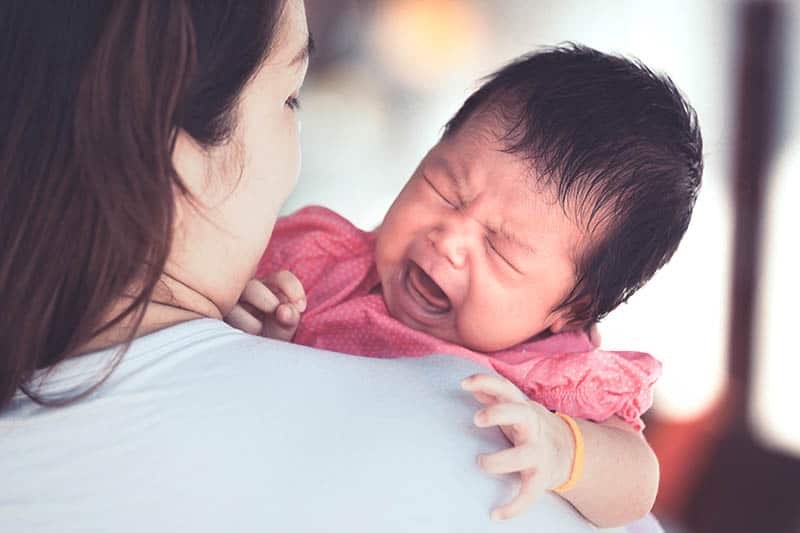
I hope these reasons for your baby crying in sleep and tips on how to soothe them helped you. However, the most sincere tidbit I can offer you is that you’ll get used to it.
You’re going to be spending many sleepless nights and your baby will cry in her sleep many more times in the future, for sure.
Her sleep pattern isn’t stable yet and having some sleep problems is perfectly normal.
If your baby is old enough (over four months old), I also recommend that you try sleep training – trust me, it makes for not only a happier baby, but a more well-rested mama!
You’ll find there are some simple techniques to soothe your baby and help her begin sleeping through the night or at least for longer periods during the night.
However, the first four months she needs you, and no matter how many times your baby wakes up, you need to pick her up, breastfeed her, cuddle her – anything that will calm her and ultimately help your baby sleep better.
I send you all one big virtual hug.
As l always say: Parents are real-life heroes and each and every one of you is doing a great job! Just keep being awesome and always remember that patience is your greatest ally.
References:
American Academy of Pediatrics. (2012). Breastfeeding and the use of human milk. Pediatrics, 129(3), e827–e841.
Like this post? Please share or pin it for later. You can also stay in the loop and follow us on Facebook, Instagram and Pinterest.
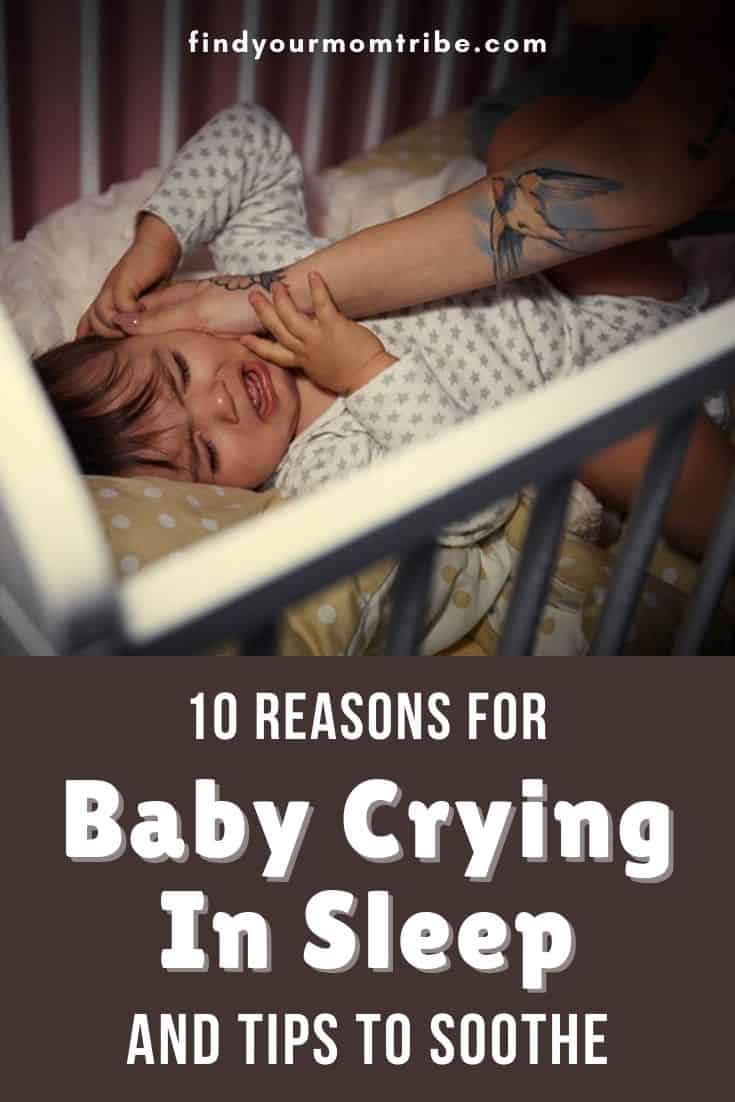
This post contains affiliate links. Please see our full disclosure or more info.

